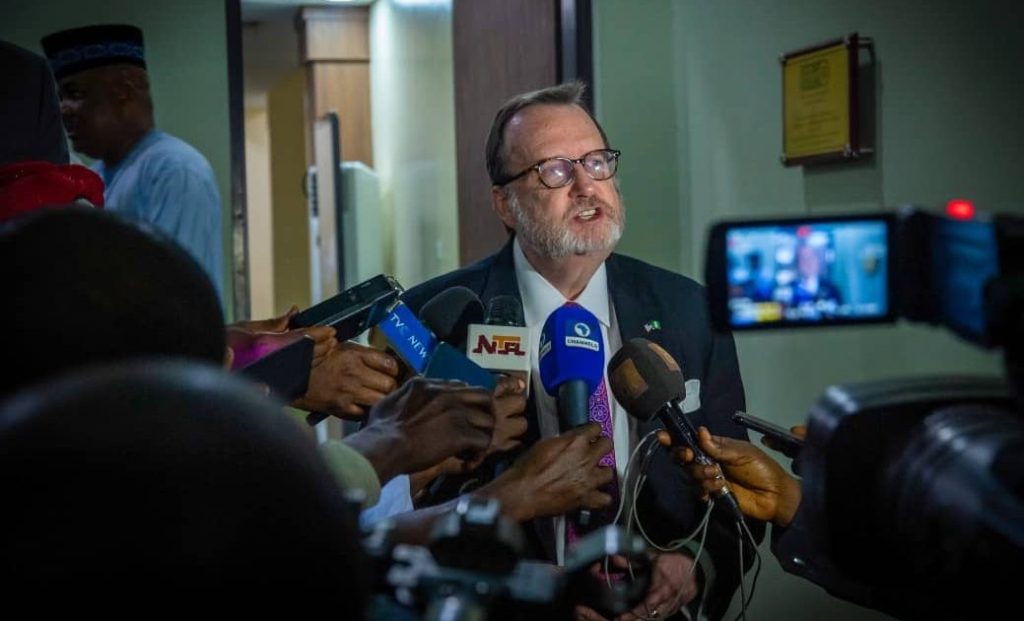The United States has implemented revised visa regulations affecting Nigerian citizens, causing some concern and requiring clarification from both U.S. and Nigerian officials. These changes, primarily impacting non-immigrant visas such as those for business, tourism, students, and exchange visitors, limit the validity of these visas to three months with single-entry access. U.S. Ambassador to Nigeria, Richard Mills, emphasized that these modifications are not punitive but rather part of a broader global initiative to strengthen security measures, improve service delivery, and ensure adherence to U.S. immigration laws. The U.S. government is undertaking a comprehensive review of visa operations worldwide, prioritizing enhanced security protocols, and these changes reflect that ongoing process.
Ambassador Mills underscored the continued importance of the U.S.-Nigeria relationship, highlighting the ongoing exchange between the two countries for various purposes, including education, business, tourism, medical treatment, and family visits. He stressed that while the U.S. welcomes Nigerian visitors, adherence to visa regulations is paramount. Visa misuse, such as overstaying the permitted duration or providing false information during the application process, can have serious consequences, including deportation and potentially a lifetime ban on future travel to the U.S. Ambassador Mills urged applicants to maintain honesty and transparency throughout the visa process, emphasizing that compliance fosters mutual trust and respect between the two nations.
The U.S. is implementing more stringent background checks for visa applicants, including access to Nigerian criminal records, as part of the enhanced security measures. This necessitates cooperation between the U.S. and Nigerian governments to establish mechanisms for sharing relevant information, ensuring thorough vetting of applicants. Ambassador Mills acknowledged the Nigerian government’s efforts to facilitate this information exchange. He also clarified the implications for student visa holders, warning that failure to attend classes or leaving a program of study without notifying the educational institution could lead to visa revocation.
Addressing concerns about the new visa procedures, Nigerian Minister of Information and National Orientation, Mohammed Idris, echoed Ambassador Mills’s assertion that the changes are not discriminatory. He confirmed prior discussions with the ambassador, reinforcing the understanding that the modifications aim to enhance service delivery and are not intended as a punitive measure against Nigerian citizens. Minister Idris acknowledged the frequency with which Nigerians travel to the U.S. and emphasized the importance of clear and readily available information regarding visa processes. The Nigerian Ministry of Information will collaborate with the U.S. Mission to ensure transparency and public awareness regarding consular matters.
Both Ambassador Mills and Minister Idris appealed to Nigerians to comply with U.S. visa regulations, recognizing the importance of respecting the laws of host countries. Minister Idris urged Nigerians to uphold their nation’s image abroad and emphasized the reciprocal expectation that visitors to Nigeria also adhere to Nigerian laws. He reiterated the strong relationship between the two countries and underscored the need for ongoing communication and cooperation to facilitate legitimate travel and cultural exchange. The Ministry of Information is committed to working with the U.S. Embassy to provide accurate and timely information to Nigerians regarding visa procedures, ensuring a smoother and more transparent process for applicants.
The revised visa regulations reflect a global shift towards stricter security measures in international travel. While the changes may present some challenges, both the U.S. and Nigerian governments are committed to maintaining a strong bilateral relationship and facilitating legitimate travel between the two countries. The emphasis on transparency, communication, and mutual respect is crucial to addressing concerns and ensuring that Nigerians understand the new procedures, minimizing disruptions and fostering continued cooperation between the U.S. and Nigeria. The focus on visa compliance and enhanced security measures is intended to protect both countries while preserving the important cultural and economic ties that bind them together.


